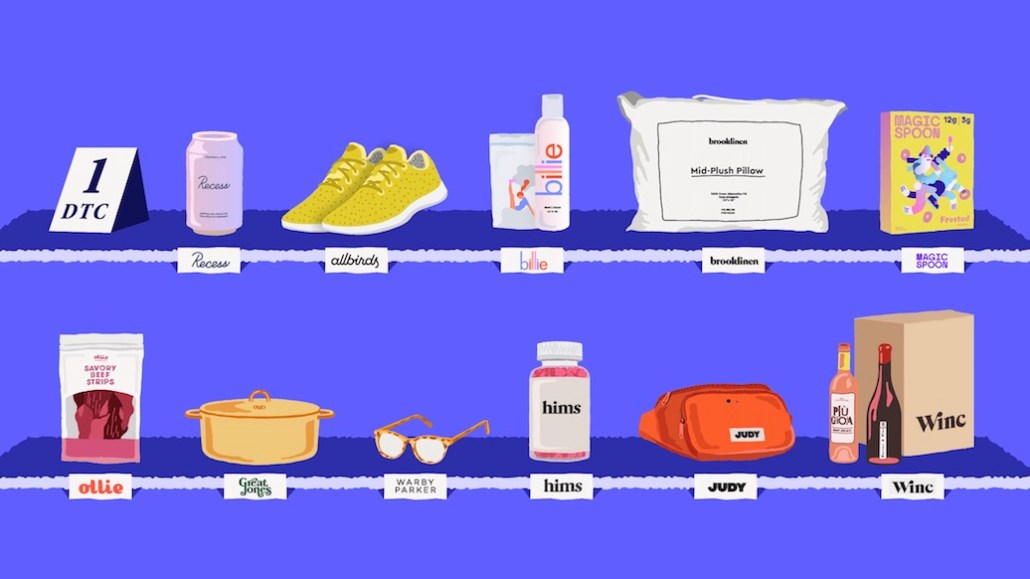
Over the past two months, digitally native startups have been some of the biggest beneficiaries of store closures.
Yes, many startups like Away and Rent the Runway were hammered, as appetite all for travel and high end fashion all but disappeared. Additionally, companies that expanded heavily into physical retail — once viewed as a prudent move in the face of rising customer acquisition costs online — have also been hurt.
But, in having interviewed more than a dozen startups for this column over the past two months, a surprising number have reported seeing some of their best-ever sales days during the coronavirus pandemic, and/or seeing some of their highest month-over-month growth. Some of the bigger “winners” of the stay at home orders have been more obvious than others, like pet food and beverage brands. But others have been more unexpected, like DTC underwear brand Parade, which said that it’s been seeing 40% month-over-month growth on average. Or swimwear brand Andie, which is on track to report its highest month of sales in May after revenue plunged in mid-March.
Part of this growth was due to the fact that shoppers had fewer options. Soon, shoppers’ options will expand as stores open back up in more states. The coming months will prove just how much of the growth direct-to-consumer brands experienced was a flash in the pan. Did they win over customers while stores were closed because they were the only website with reasonable shipping times for weights or hand sanitizers? Or will these customers come back because these startups have truly built a better experience or product?
“People are going to go to stores mainly because there’s not much else you can do,” said Web Smith, founder of 2pm Inc. “Naturally, we are going to see a drop off in commerce over the next month, two, or three.” However, he said that could change if states re-issue stay at home orders should cases rise, as some epidemiologists are warning of the potential of a “second wave” in the fall.
When non-essential retailers were ordered shut, the DTC brands born online were in a better position to get goods to customers than legacy retailers who only recently invested in e-commerce. While many people are still hesitant to visit stores, that will change the longer they’re open. Over time, people are going to start to resume some of their normal shopping habits. For example, there’s signs that online grocery shopping is peaking. A survey conducted this week by CivicScience on behalf of Bloomberg found that over one-third of shoppers plan to stop ordering groceries online altogether, or use it less once stay at home orders are lifted in their area.
“I don’t think we are going to a world where consumers only shop online and that’s it,” said Caitlin Strandberg, principal at Lerer Hippeau. But, she said “we expect to see the longstanding incumbents lose market share from these 2-3 months of shelter in place, where they weren’t able to serve their customers effectively. Their customers were living online, living on Instagram, living on Facebook, doing more search and discovery.”
Continuing to win over customers when they have the option of visiting stores again depends upon, to use a retail cliché, startups’ ability to meet customers where they are. The promise of direct-to-consumer brands has always lied in the fact that, ostensibly, they are closer to their customers than legacy retailers. Now is their time to prove it.
In the early days of the pandemic, that meant quickly spinning up production of face masks or hand sanitizer, or donating to organizations in need. Now, that means introducing products to better meet the needs of what people are actually going to be doing this summer, and running marketing that isn’t tone deaf to what people are experiencing right now.
In years past, for example, swimwear company Andie’s customers may have been buying suits for trips to the Bahamas or Mexico. Now, they’re likely spending their summer in their backyard pool or at the local beach. So, Andie is introducing new product bundles, that are geared towards customers who will be camped out in their yard for most of the summer. Andie has partnered with other brands on a wholesale arrangement to sell tumblers, towels and sunscreen among other products on its website for the first time. And, in order to promote a new line of eco-friendly swimsuits it is also launching next week, Andie used its employees as models.
“In non-pandemic times, we have leaned into traveling to beautiful destinations…we’ve also done a lot more sort of what I would call ‘chest pumping marketing,’ like, ‘this is the best swimsuit of all time,”’ said Melanie Travis, founder and CEO of Andie. “In general now we have to show that we are aware of the situation, we are living in the same situation as everyone else.”
More in Marketing

WTF are tokens?
When someone sends a prompt or receives a response, the system breaks language into small segments. These fragments are tokens.

AI is changing how retailers select tech partners
The quick rise of artificial intelligence-powered tools has reshaped retailers’ process of selecting technology partners for anything from marketing to supply chain to merchandising.

YouTube’s upmarket TV push still runs on mid-funnel DNA
YouTube is balancing wanting to be premium TV, the short-form powerhouse and a creator economy engine all at once.





